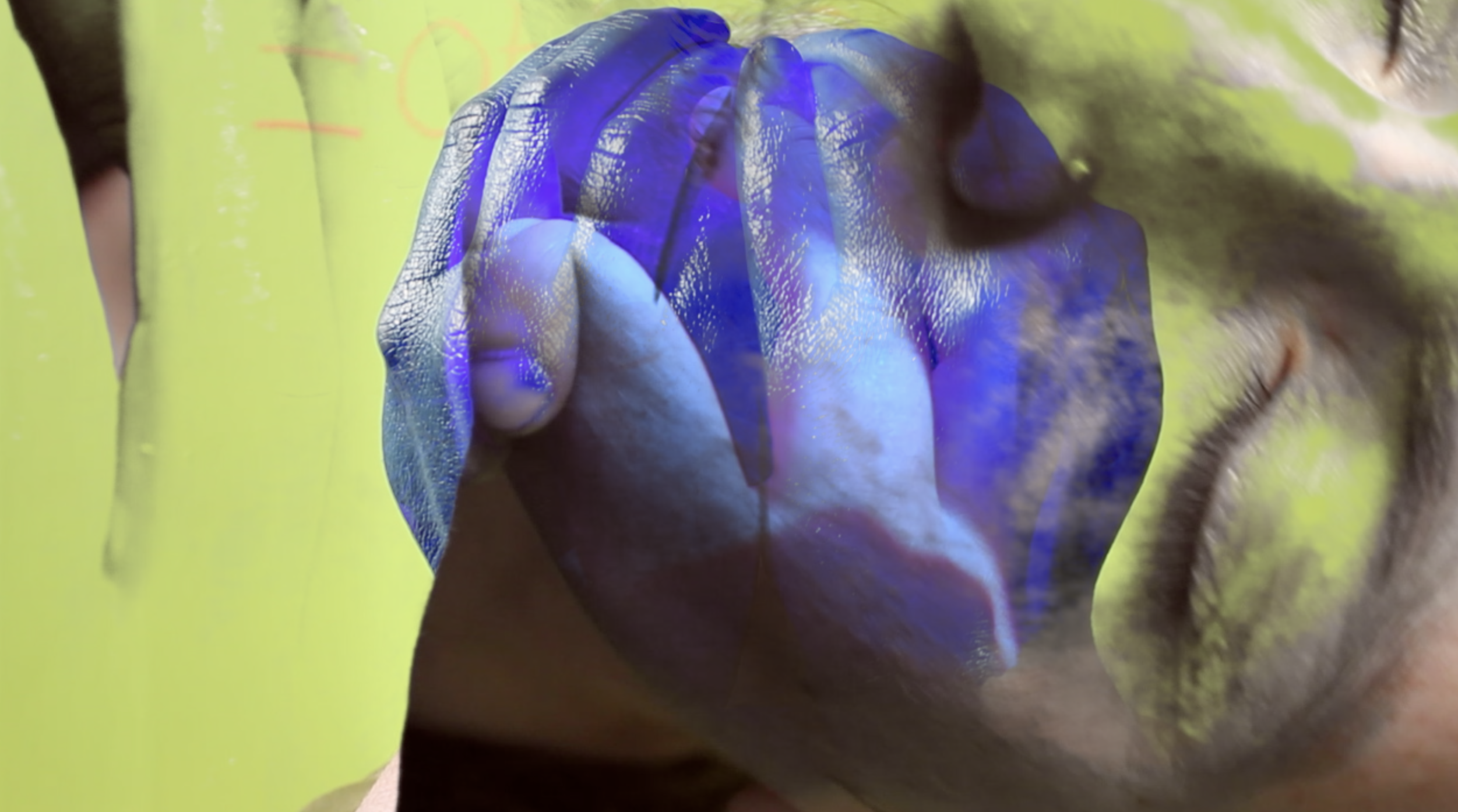RESEARCH - ART - COLLECTIVE
Significant Otherness Co-/lab (SO) is an interdisciplinary research-collaboration between Saskia Burggraaf and Anne Mul. Together they are composting culture. They are taking the shit we’ve been given and transforming it with intersectional activism, queerness, and reevaluating what it is to be a significant other. Their shared research practices evolve around the (re)production of care, culture and knowledge.
Their collaboration aims to seek out and interrupt ways in which hegemonic practices emerge and are (re)produced in different spaces. For Mul and Burggraaf, interrupting is not only identifying oppression but generating and (re)building practices of resistance, refusal and transformation. By intentionally reshuffling normative priorities, they attune to (different) practices for (different) bodies in (different) surroundings. To do this, Burggraaf and Mul draw from an interdisciplinary conceptual toolbox to gather, remix and compost research methods and analysis from art, feminist science and technology studies (STS), and social scientific research. This can bloom into workshops, collaborative work practices, publications in various forms including writing, sound, image, text and performance. We’ve taken the cues that we need to create brave spaces to learn and grow in public; to dare to connect, take responsibility for change and put transformative justice politics into daily practice.
Their collaboration aims to seek out and interrupt ways in which hegemonic practices emerge and are (re)produced in different spaces. For Mul and Burggraaf, interrupting is not only identifying oppression but generating and (re)building practices of resistance, refusal and transformation. By intentionally reshuffling normative priorities, they attune to (different) practices for (different) bodies in (different) surroundings. To do this, Burggraaf and Mul draw from an interdisciplinary conceptual toolbox to gather, remix and compost research methods and analysis from art, feminist science and technology studies (STS), and social scientific research. This can bloom into workshops, collaborative work practices, publications in various forms including writing, sound, image, text and performance. We’ve taken the cues that we need to create brave spaces to learn and grow in public; to dare to connect, take responsibility for change and put transformative justice politics into daily practice.
Chapter 1: Relational Distribution
Cultures exist within cultures (family culture, work culture, friend culture, national culture, continental cultures). In a globalizing world, locational and digital contexts influence norms and values.
Understanding (cultural) standards helps to make sense of varying and overlapping normativities.
SO sees relational distrubution as the ways in which connection, (group) dynamics, (co-)dependence, (un-)intentional attachments and other forms of contact are (re)produced.
Relational distribution asks us to reflect on networks of care, the signifiers of accepted relational standards and normativities of “should”.
adrienne marie brown writes: “the deepest pleasure comes from riding the line between commitment and detachment”
SO asks: What does this mean in relation to intentionality?
How do we create networks of care? And what it means to practice love?
This chapter is an ongoing public reflection on these questions. SO has been doing different forms of artistic research through writing, making video and forming workshops based on these questions and reflections.
You can find examples of Prompts, writing exercises, sketches that fit this chapter, underneath this text. The newest are presented at the top of the page and additions will be added in the future, when we collaborate with artists, do workshops, or anything else related to the topics of this chapter.
Prompt 3: Learning in Public
Methodology: film, photography, interactive queer reading corner/library
Words: Learning, Love, Care, Relations, Education, Knowledge (production)
Exhibition at Flinty’s during Queer Kunstlijn Haarlem
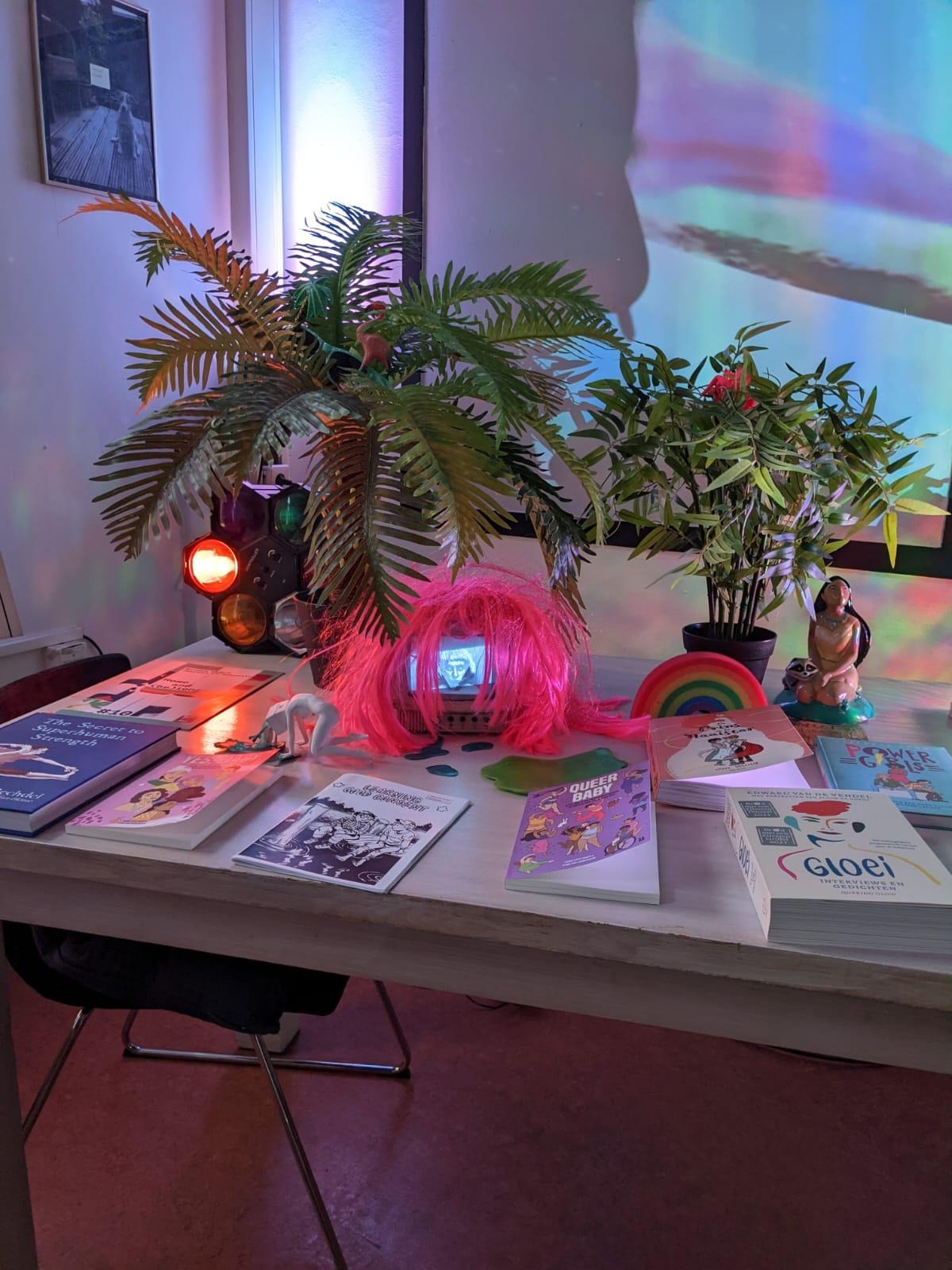
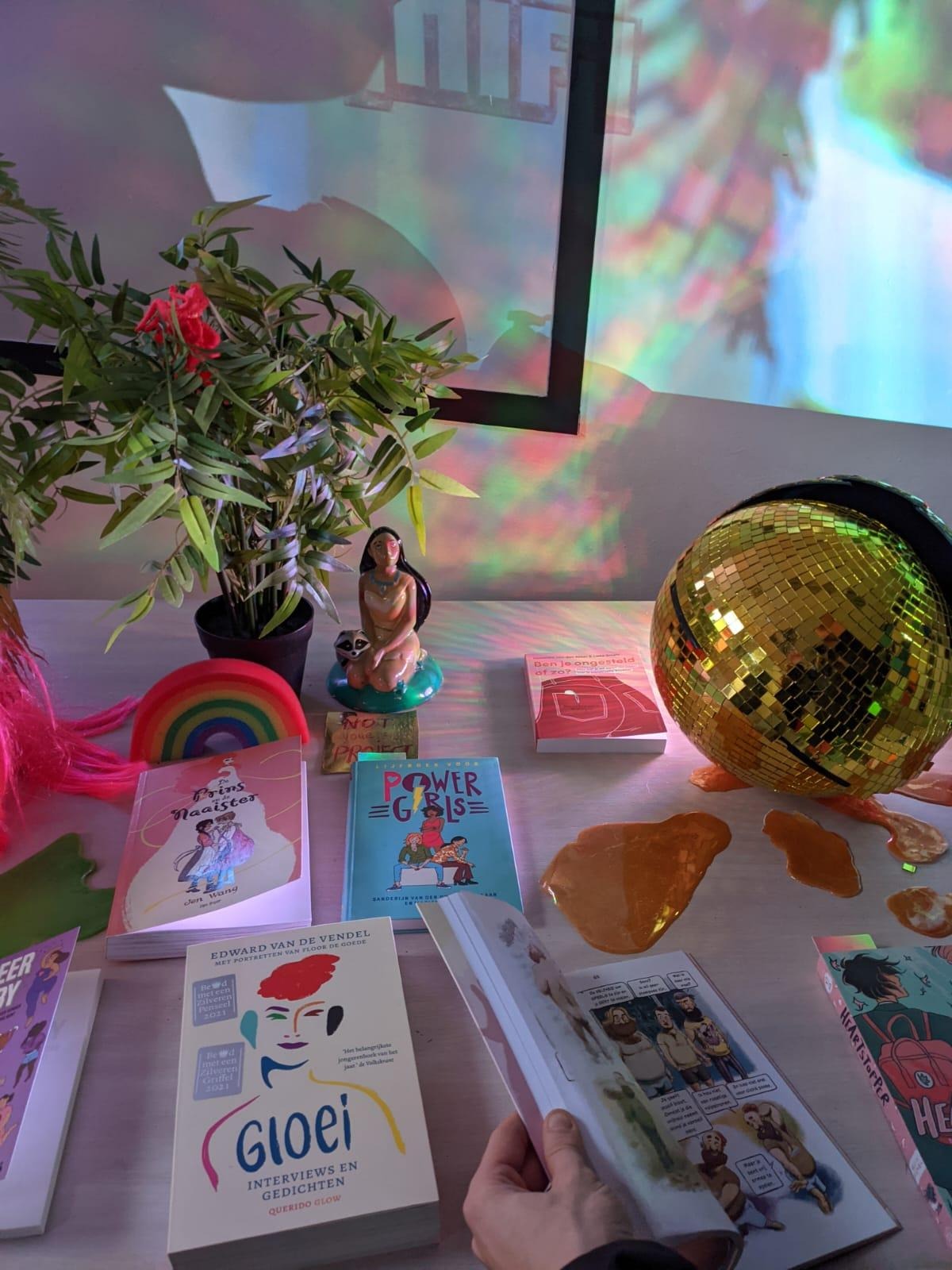
This work was made in the context of a youth centre/cultural centre of Flinty’s in Haarlem during the Queer Kunstlijn Exhibition, including works of Rowena Buur, Aileen Yee, Mojdeh Feili, Najiba Yasmin, and was curated by Anne Mul. This was the first of many queer hang outs and the first library we tried out. We will continue expanding our collection and sharing it in hang out and educational get togethers.
![]()
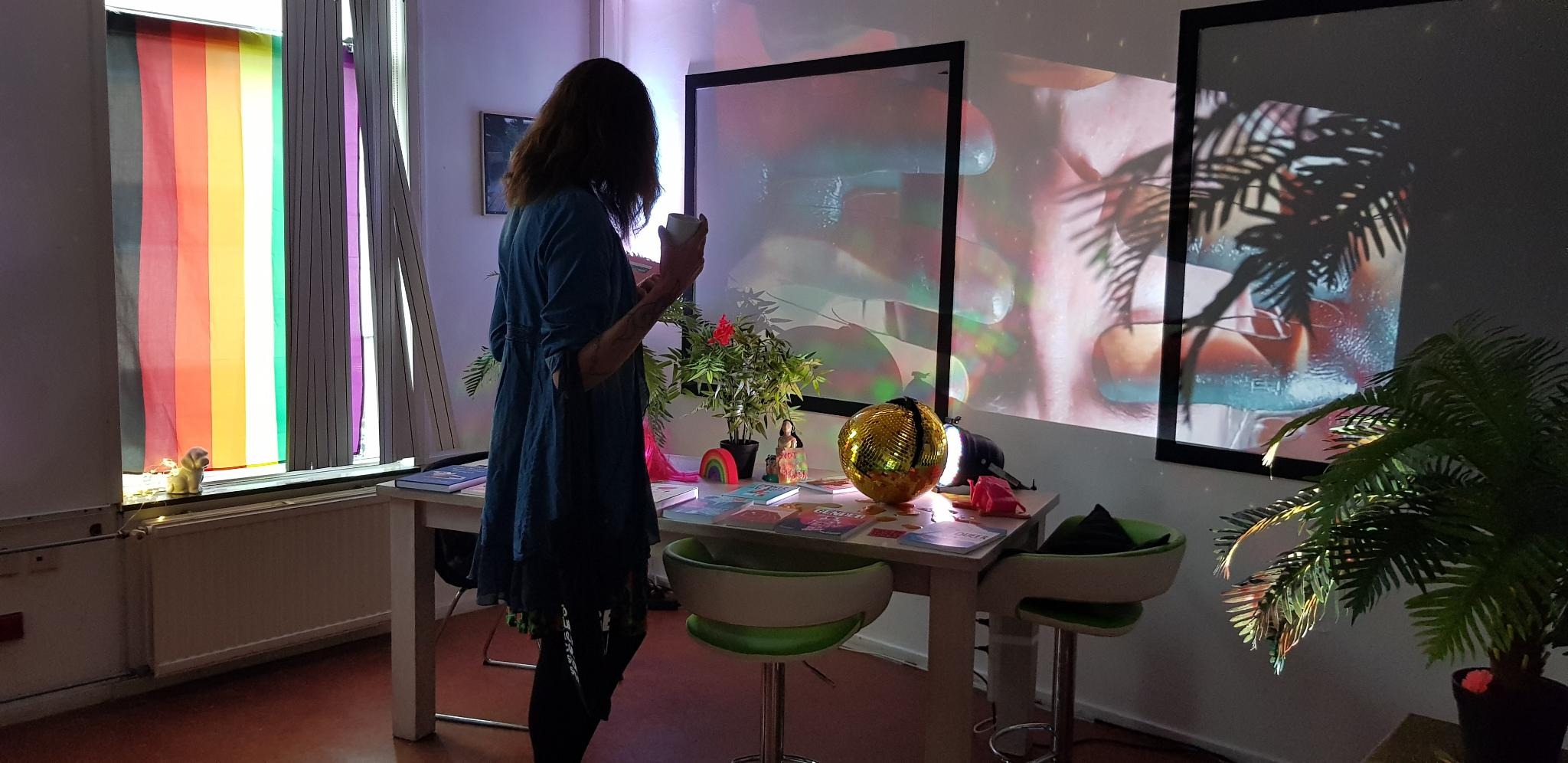
Prompt 2: We don't learn to love in a linear path
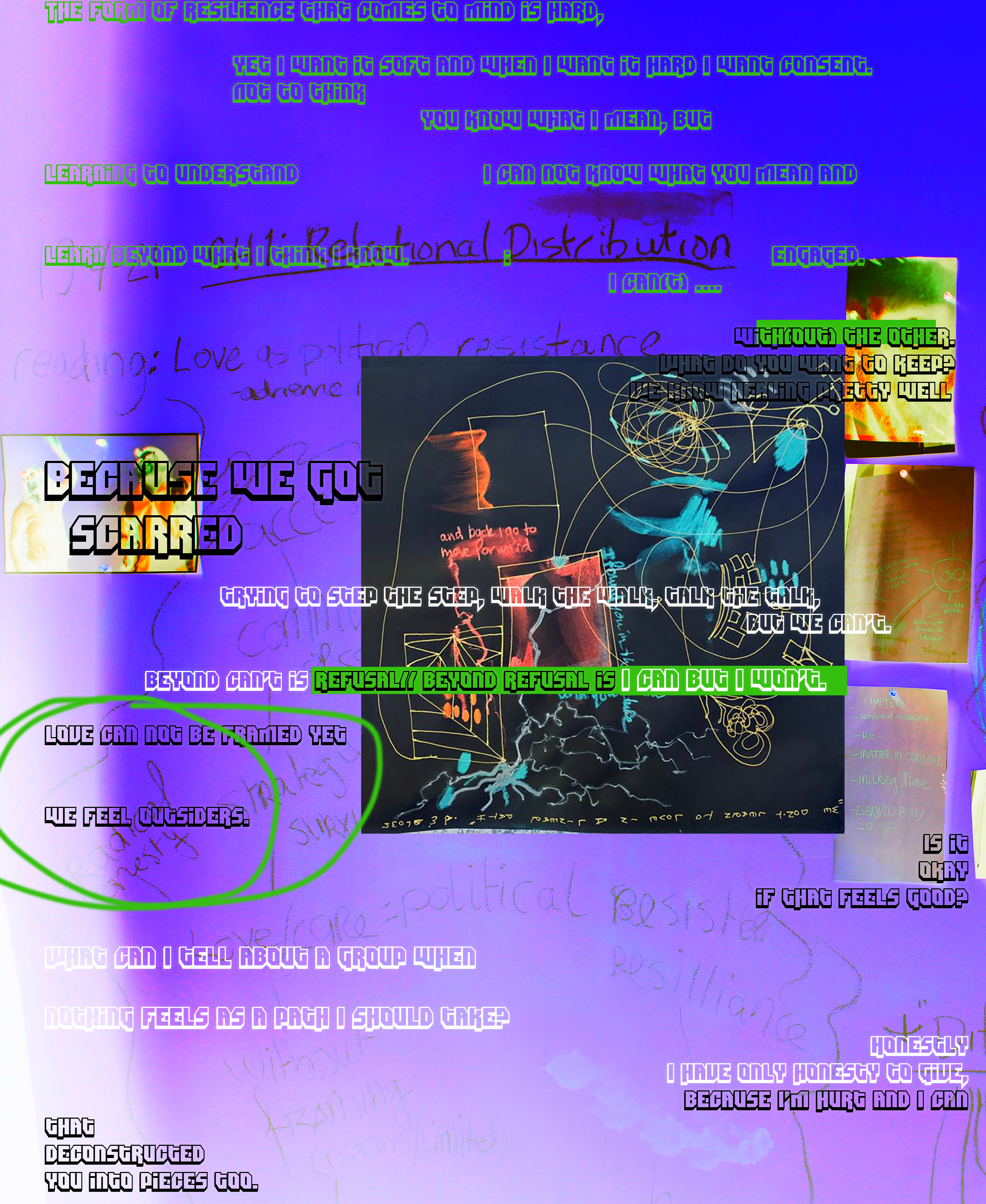
Methodology: writing exchange / collaborative working, collage
Words: Touch, Love, Care,
Political Resistance
Resilience, Radical honesty
The form of resilience that comes to mind is hard,
yet I want it soft and when I want it hard I want consent.
Not to think
you know what I mean, but
learning to understand I can not know what you mean and
learn beyond what I think I know. ~ Engaged.
I can(t) ….
with(out) the other.
What do you want to keep? We know healing pretty well
because we got
trying to step the step, walk the walk, talk the talk,
but we can't.
Beyond can't is refusal// beyond refusal is I can but I won't.
Love can not be framed yet
we feel outsiders.
Is it
okay
if that feels good?
What can I tell about a group when
nothing feels as a path I should take?
Honestly
That
deconstructed
you into pieces too.
yet I want it soft and when I want it hard I want consent.
Not to think
you know what I mean, but
learning to understand I can not know what you mean and
learn beyond what I think I know. ~ Engaged.
I can(t) ….
with(out) the other.
What do you want to keep? We know healing pretty well
because we got
scarred
trying to step the step, walk the walk, talk the talk,
but we can't.
Beyond can't is refusal// beyond refusal is I can but I won't.
Love can not be framed yet
we feel outsiders.
Is it
okay
if that feels good?
What can I tell about a group when
nothing feels as a path I should take?
Honestly
I have only honesty to give,
because I'm hurt and I canThat
deconstructed
you into pieces too.
Prompt 1: finding ways to be together

Methodology: Blue screen video
& collaborative writing
Words: Touch, Care,
Other centered epistemology,
Re-making, Significant otherness
In aggression, I can learn what a boundary is. Boundaries are for me. Me to make. Me to know. Me to build. Over time it builds up. Like the building of a home. Layers of materials, each layer providing possibility. Frame, electra, fluid pathways, fireproofing, aesthetics. The small hairs on the top of my hand feel a boundary earlier than my brain. My body knows things I can't comprehend through thought. The other's brain- when touching does not compute- through neither hair, nor pores. I am open and closed. My pores are the only way to enter my skin without damaging it.(1) I am (un)willingly (im)permeable. The sweat from my palms remind me how I'm wired, reminding me I don't want to shake your hand as a gesture, as a pre-set. My body is electric, whatever I touch I change.(2) Yet the framework made me decide I do it anyway. Can I reframe? Can we change structure without destruction? The performative seems to teach me in public what I don't want. Performing helps me break down truths. I want to learn in public what I do want. I want to collaborate with others. Transgressing the automatic memory of performative organization. Let’s rot together, change together, decompose into nutrients to bloom together.
(1) Sarah Ahmed, Jackie Stacey, Thinking through the Skin, 2001
(2) Octavia Butler, Parable of the Sower, 1993.
(3)
adrienne maree brown, Emergent Strategy, 2017
(1) Sarah Ahmed, Jackie Stacey, Thinking through the Skin, 2001
(2) Octavia Butler, Parable of the Sower, 1993.
(3)
adrienne maree brown, Emergent Strategy, 2017
Prompt 0: Entanglement is a network of care
![]()
Methodology: Dancing & bluescreen video, while writing simultaneously
Words: Touch, Care, Other centered epistemology, Re-making, Significant otherness
Words: Touch, Care, Other centered epistemology, Re-making, Significant otherness
When epistemology is beyond what can be grasped as...categorized, organized, linear, I can see your touch as caring, not a product. Not a burn, not chronological.(1) The 'normal' speed of time makes me juggle space in a timeframe so I forget to feel. It is a nice feeling not knowing where you start and where I began. Entanglement is a network of care. The violence of time changed a rhythm, yet does not make every other change the same. Your otherness is not mine and we could never end up being one, but that's okay. Separate together. Many touches marked how space was individualised yet hegemonic, and I want to see every layer of that, ugly or marked beautiful. We weave together; each individual rhythm, sound, note- every element creates our song.
What does it mean to hold each other, to touch each other, to be physically present with each other. Now turn that inwards. What does that mean to the self?
We are significant others to one another.(2)
Our versions of ourselves are also significant others, and unknown to others. Or they think they know. Worlds hide inside my skin.
Letting ourselves be and change and grow and bloom can lead to a remaking. A rediscovering, retelling stories otherwise. A redistributing of what's considered valuable. An active remaking of the self, caring for all of our internal and external others is a practice. When does a practice become a habit? When does a groove become a rut? When does doing and being become a normativity? What if trauma interrupted intuition, how do we repair without becoming 'better'?(3) Without casting forms to fit the masses, how do we resist the capitalist form of healthy growth?
I hold you not the way in which I want to be held but rather ask, how do you want to be held? Can I hold you this way? Can we bloom together? Can we compost ourselves together?
(1) Ivana Milojevic, Timing feminism, feminising time, 2007
(2) Donna Haraway, The Companion Species Manifesto, 2003
(3) Marta Russel, Ravi Malthortra H. Capitalism and Disability, Social Register, 2002
What does it mean to hold each other, to touch each other, to be physically present with each other. Now turn that inwards. What does that mean to the self?
We are significant others to one another.(2)
Our versions of ourselves are also significant others, and unknown to others. Or they think they know. Worlds hide inside my skin.
Letting ourselves be and change and grow and bloom can lead to a remaking. A rediscovering, retelling stories otherwise. A redistributing of what's considered valuable. An active remaking of the self, caring for all of our internal and external others is a practice. When does a practice become a habit? When does a groove become a rut? When does doing and being become a normativity? What if trauma interrupted intuition, how do we repair without becoming 'better'?(3) Without casting forms to fit the masses, how do we resist the capitalist form of healthy growth?
I hold you not the way in which I want to be held but rather ask, how do you want to be held? Can I hold you this way? Can we bloom together? Can we compost ourselves together?
(1) Ivana Milojevic, Timing feminism, feminising time, 2007
(2) Donna Haraway, The Companion Species Manifesto, 2003
(3) Marta Russel, Ravi Malthortra H. Capitalism and Disability, Social Register, 2002
Chapter 2: Re-...
Prompt 0: Re:Disrupting as an act of care
Methodology: writing exchange, video, drawing, audio recording
The texts you hear in the video are parts of earlier writing of several chapters.
The video was part of the exhibition “Wij Zijn Nieuwe Vide” at Nieuwe Vide Artspace
We have used texts of ourselves, Erin Manning, and quotes of Deleuze. The concept ‘pleasure activism’ comes from adrienne maree brown.
IN THE MAKING
IN THE MAKING - TRY OUT IN BLUE/FUCK CHRONOLOGY AS TRUTHTELLING
